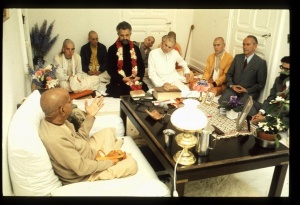CC Antya 4.197: Difference between revisions
m (1 revision(s)) |
(Vanibot #0054 edit - transform synonyms into clickable links, which search similar occurrences) |
||
| (One intermediate revision by one other user not shown) | |||
| Line 1: | Line 1: | ||
{{ | [[Category:Sri Caitanya-caritamrta - Antya-lila Chapter 04]] | ||
<div style="float:left">'''[[Sri Caitanya-caritamrta|Śrī Caitanya-caritāmṛta]] - [[CC Antya|Antya-līlā]] - [[CC Antya 4|Chapter 4: Sanātana Gosvāmī Visits the Lord at Jagannātha Purī]]'''</div> | |||
<div style="float:right">[[File:Go-previous.png|link=CC Antya 4.196|Antya-līlā 4.196]] '''[[CC Antya 4.196|Antya-līlā 4.196]] - [[CC Antya 4.198|Antya-līlā 4.198]]''' [[File:Go-next.png|link=CC Antya 4.198|Antya-līlā 4.198]]</div> | |||
{{CompareVersions|CC|Antya 4.197|CC 1975|CC 1996}} | |||
{{RandomImage}} | |||
==== TEXT 197 ==== | ==== TEXT 197 ==== | ||
<div | <div class="verse"> | ||
pāriṣada-deha ei, nā haya durgandha | :pāriṣada-deha ei, nā haya durgandha | ||
prathama divase pāiluṅ catuḥsama-gandha“ | :prathama divase pāiluṅ catuḥsama-gandha“ | ||
</div> | </div> | ||
| Line 12: | Line 16: | ||
==== SYNONYMS ==== | ==== SYNONYMS ==== | ||
<div | <div class="synonyms"> | ||
pāriṣada- | ''[//vanipedia.org/wiki/Special:VaniSearch?s=pāriṣada&tab=syno_o&ds=1 pāriṣada]-[//vanipedia.org/wiki/Special:VaniSearch?s=deha&tab=syno_o&ds=1 deha]'' — the body of Kṛṣṇa’s associate; ''[//vanipedia.org/wiki/Special:VaniSearch?s=ei&tab=syno_o&ds=1 ei]'' — this; ''[//vanipedia.org/wiki/Special:VaniSearch?s=nā&tab=syno_o&ds=1 nā] [//vanipedia.org/wiki/Special:VaniSearch?s=haya&tab=syno_o&ds=1 haya]'' — is not; ''[//vanipedia.org/wiki/Special:VaniSearch?s=durgandha&tab=syno_o&ds=1 durgandha]'' — having a bad smell; ''[//vanipedia.org/wiki/Special:VaniSearch?s=prathama&tab=syno_o&ds=1 prathama] [//vanipedia.org/wiki/Special:VaniSearch?s=divase&tab=syno_o&ds=1 divase]'' — on the first day; ''[//vanipedia.org/wiki/Special:VaniSearch?s=pāiluṅ&tab=syno_o&ds=1 pāiluṅ]'' — I got; ''[//vanipedia.org/wiki/Special:VaniSearch?s=catuḥsama&tab=syno_o&ds=1 catuḥsama]-[//vanipedia.org/wiki/Special:VaniSearch?s=gandha&tab=syno_o&ds=1 gandha]'' — the smell of ''catuḥsama'', a mixture of sandalwood pulp, camphor, ''aguru'' and musk. | ||
</div> | </div> | ||
| Line 19: | Line 23: | ||
==== TRANSLATION ==== | ==== TRANSLATION ==== | ||
<div | <div class="translation"> | ||
“Sanātana Gosvāmī is one of the associates of Kṛṣṇa. There could not be any bad odor from his body. On the first day I embraced him, I smelled the aroma of catuḥsama [a mixture of sandalwood pulp, camphor, aguru and musk].” | “Sanātana Gosvāmī is one of the associates of Kṛṣṇa. There could not be any bad odor from his body. On the first day I embraced him, I smelled the aroma of catuḥsama [a mixture of sandalwood pulp, camphor, aguru and musk].” | ||
</div> | </div> | ||
| Line 26: | Line 30: | ||
==== PURPORT ==== | ==== PURPORT ==== | ||
<div | <div class="purport"> | ||
An associate of the Lord is one whose body is fully engaged in the service of the Lord. A materialist might see Sanātana Gosvāmī’s body as being full of itching sores that exuded foul moisture and a bad smell. Śrī Caitanya Mahāprabhu, however, said that actually the aroma of his body was the excellent scent of a mixture of sandalwood pulp, camphor, musk and aguru. In the Garuḍa Purāṇa this mixture, which is called catuḥsama, is described as follows: | An associate of the Lord is one whose body is fully engaged in the service of the Lord. A materialist might see Sanātana Gosvāmī’s body as being full of itching sores that exuded foul moisture and a bad smell. Śrī Caitanya Mahāprabhu, however, said that actually the aroma of his body was the excellent scent of a mixture of sandalwood pulp, camphor, musk and ''aguru''. In the ''Garuḍa Purāṇa'' this mixture, which is called ''catuḥsama'', is described as follows: | ||
:kastūrikāyā dvau bhāgau catvāraś candanasya tu | :''kastūrikāyā dvau bhāgau catvāraś candanasya tu'' | ||
:kuṅkumasya trayaś caikaḥ śaśinaḥ syāt catuḥ-samam | :''kuṅkumasya trayaś caikaḥ śaśinaḥ syāt catuḥ-samam'' | ||
“Two parts of musk, four parts of sandalwood, three parts of aguru or saffron and one part of camphor, when mixed together, form catuḥsama.” The aroma of catuḥsama is very pleasing. It is also mentioned in the Hari-bhakti-vilāsa ( | “Two parts of musk, four parts of sandalwood, three parts of ''aguru'' or saffron and one part of camphor, when mixed together, form ''catuḥsama''.” The aroma of ''catuḥsama'' is very pleasing. It is also mentioned in the ''Hari-bhakti-vilāsa'' (sixth ''vilāsa'' ). | ||
</div> | </div> | ||
__NOTOC__ | |||
<div style="float:right; clear:both;">[[File:Go-previous.png|link=CC Antya 4.196|Antya-līlā 4.196]] '''[[CC Antya 4.196|Antya-līlā 4.196]] - [[CC Antya 4.198|Antya-līlā 4.198]]''' [[File:Go-next.png|link=CC Antya 4.198|Antya-līlā 4.198]]</div> | |||
__NOTOC__ | |||
__NOEDITSECTION__ | |||
Latest revision as of 20:34, 19 February 2024

A.C. Bhaktivedanta Swami Prabhupada
TEXT 197
- pāriṣada-deha ei, nā haya durgandha
- prathama divase pāiluṅ catuḥsama-gandha“
SYNONYMS
pāriṣada-deha — the body of Kṛṣṇa’s associate; ei — this; nā haya — is not; durgandha — having a bad smell; prathama divase — on the first day; pāiluṅ — I got; catuḥsama-gandha — the smell of catuḥsama, a mixture of sandalwood pulp, camphor, aguru and musk.
TRANSLATION
“Sanātana Gosvāmī is one of the associates of Kṛṣṇa. There could not be any bad odor from his body. On the first day I embraced him, I smelled the aroma of catuḥsama [a mixture of sandalwood pulp, camphor, aguru and musk].”
PURPORT
An associate of the Lord is one whose body is fully engaged in the service of the Lord. A materialist might see Sanātana Gosvāmī’s body as being full of itching sores that exuded foul moisture and a bad smell. Śrī Caitanya Mahāprabhu, however, said that actually the aroma of his body was the excellent scent of a mixture of sandalwood pulp, camphor, musk and aguru. In the Garuḍa Purāṇa this mixture, which is called catuḥsama, is described as follows:
- kastūrikāyā dvau bhāgau catvāraś candanasya tu
- kuṅkumasya trayaś caikaḥ śaśinaḥ syāt catuḥ-samam
“Two parts of musk, four parts of sandalwood, three parts of aguru or saffron and one part of camphor, when mixed together, form catuḥsama.” The aroma of catuḥsama is very pleasing. It is also mentioned in the Hari-bhakti-vilāsa (sixth vilāsa ).